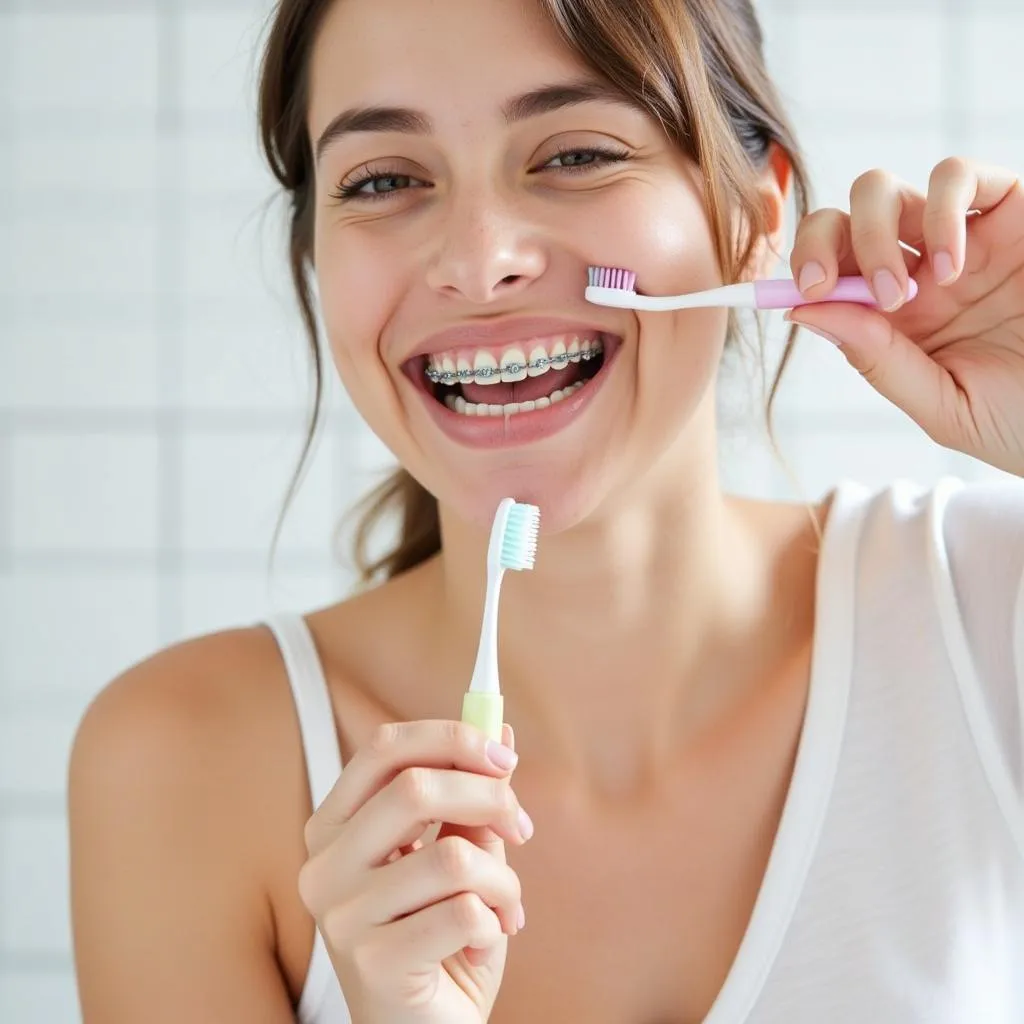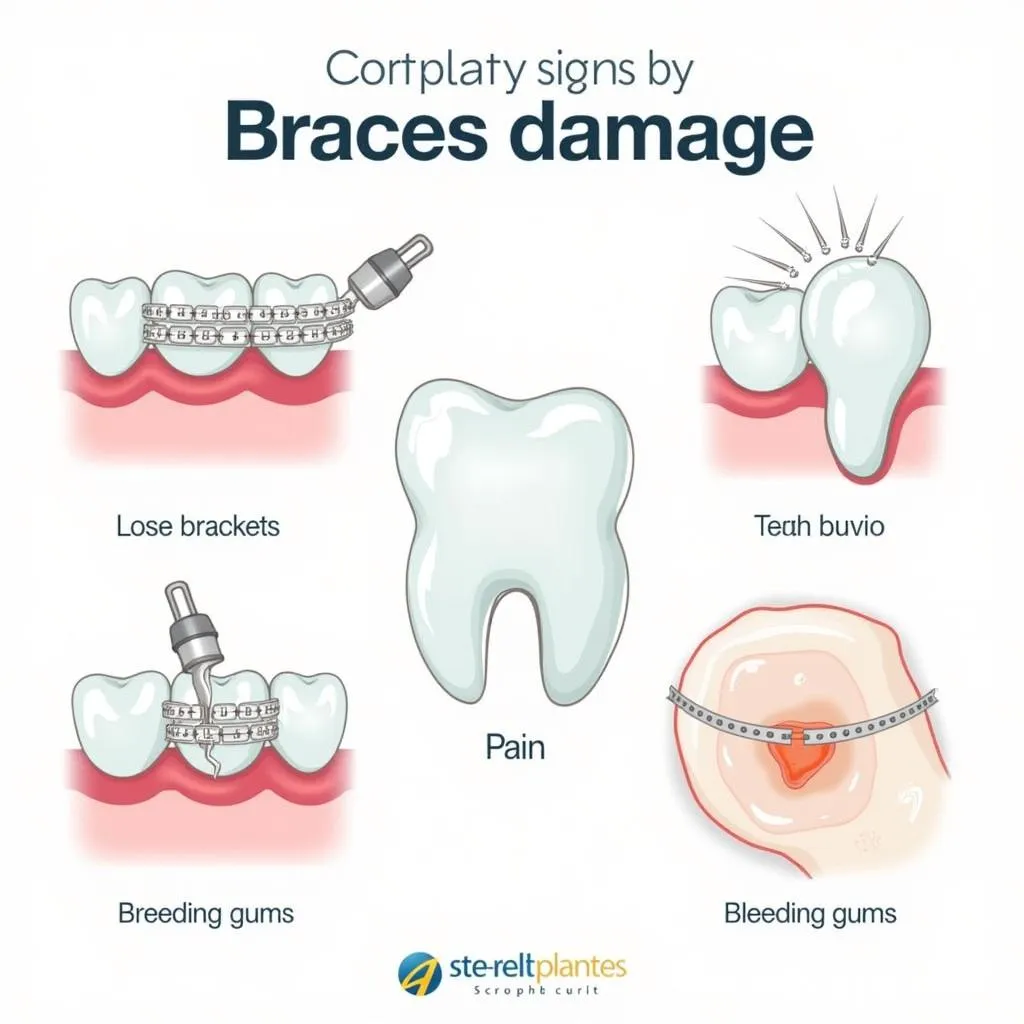Braces are a common orthodontic treatment used to straighten teeth and improve your smile. While braces can be very effective, they can also cause damage to your teeth and gums if not properly cared for.
In this article, we’ll delve into the topic of Braces Damage, exploring the common causes, symptoms, and ways to prevent it. Whether you’re currently wearing braces or considering getting them, understanding the potential risks and preventative measures is crucial.
Common Causes of Braces Damage
Braces damage can occur due to various factors, some of which are preventable. Here’s a rundown of the most common causes:
1. Improper Oral Hygiene
Maintaining excellent oral hygiene is paramount when wearing braces. Neglecting to brush and floss properly can lead to:
- Plaque and tartar buildup: These sticky films accumulate on teeth, irritating gums and increasing the risk of cavities.
- Gum disease: This condition can damage gums and bones supporting teeth, potentially causing tooth loss.
- White spots: These are demineralized areas on teeth caused by plaque and bacteria buildup.
2. Dietary Habits
Certain foods and drinks can increase the likelihood of braces damage:
- Hard and sticky foods: These can loosen or break brackets, bend wires, and damage teeth. Examples include hard candies, chewing gum, popcorn kernels, and ice.
- Sugary and acidic drinks: These can contribute to enamel erosion and tooth decay.
3. Biting and Chewing Habits
Some individuals develop habits that can lead to braces damage:
- Nail biting: This can bend or break brackets and wires.
- Chewing on pens or pencils: This habit can put excessive pressure on braces, causing them to become loose or damaged.
- Grinding or clenching teeth: This can damage brackets, wires, and even teeth.
Symptoms of Braces Damage
Recognizing the signs of braces damage is essential to seek prompt treatment and minimize further complications. Here are some common symptoms:
- Loose brackets or wires: If a bracket or wire is loose, it can easily catch on food and cause discomfort.
- Broken brackets or wires: These can become sharp and irritate the gums and cheeks.
- Pain or discomfort: Sharp pain or discomfort while chewing, speaking, or wearing braces can be a sign of damage.
- Bleeding gums: This can indicate gum irritation or infection.
- White spots on teeth: These can be a sign of enamel erosion.
- Sensitivity to hot or cold: This can indicate a cracked tooth or other damage.
Preventing Braces Damage: A Guide to Safeguard Your Smile
Taking preventive measures can significantly reduce the risk of braces damage and ensure a smooth orthodontic experience. Here are some practical tips:
1. Oral Hygiene Best Practices:
- Brush your teeth thoroughly twice a day: Use a soft-bristled toothbrush and fluoride toothpaste, and be sure to reach all areas, especially around the brackets and wires.
- Floss daily: Use a floss threader or water flosser to remove food particles and plaque from between teeth and around braces.
- Use a mouthwash: A fluoride mouthwash can help to kill bacteria and prevent cavities.
- Avoid sugary and acidic drinks: Opt for water or unsweetened beverages instead.
- Schedule regular dental checkups: See your dentist every 3-4 months for professional cleanings and to monitor your braces.
2. Dietary Considerations:
- Avoid hard, sticky, and chewy foods: Instead, opt for softer foods that are easier to chew.
- Cut food into smaller pieces: This will help reduce pressure on braces and make chewing easier.
- Drink plenty of water: Hydration is crucial for oral health and helps to rinse away food particles and sugars.
3. Habit Modification:
- Break nail-biting and chewing habits: Try alternative activities like stress balls or fidget toys to help you break these habits.
- Wear a mouthguard: If you grind or clench your teeth, a mouthguard can protect your teeth and braces.
Expert Insights:
- Dr. Emily Carter, Orthodontist: “Maintaining a consistent oral hygiene routine is crucial for braces wearers. Brushing twice a day and flossing regularly is essential to prevent plaque and tartar buildup, which can lead to gum disease and tooth decay.”
- Dr. John Smith, Dentist: “It’s important to be mindful of your diet while wearing braces. Avoiding hard, sticky, and chewy foods can prevent damage to brackets, wires, and teeth. Remember, chewing slowly and carefully will also help.”
Conclusion:
Braces damage can impact your oral health and orthodontic journey. By understanding the causes, symptoms, and preventive measures discussed above, you can significantly reduce the risk of experiencing these problems.
Remember, maintaining excellent oral hygiene, practicing healthy eating habits, and being mindful of your chewing habits are key to a successful and comfortable orthodontic experience.
FAQs
Q: Can I still eat popcorn while wearing braces?
A: It’s best to avoid popcorn while wearing braces, as the kernels can get stuck in the brackets and wires and potentially damage them.
Q: How often should I see my orthodontist for adjustments?
A: Most orthodontists recommend seeing them every 4-6 weeks for adjustments. This allows them to check your progress, tighten your wires, and make any necessary changes to your braces.
Q: Can I use whitening toothpaste while wearing braces?
A: It’s best to avoid using whitening toothpaste while wearing braces. Whitening agents can irritate the gums and can also cause staining on the brackets and wires.
Q: Is braces damage covered by insurance?
A: Most dental insurance plans cover braces, including any necessary repairs or replacements due to damage. However, it’s always best to check with your insurance provider to confirm coverage.
Q: Can braces damage my teeth?
A: If braces are not properly cared for, they can lead to damage to your teeth and gums. However, with good oral hygiene and preventive measures, braces can help to straighten your teeth and improve your overall oral health.
 Preventing Braces Damage: A Guide to Safeguard Your Smile
Preventing Braces Damage: A Guide to Safeguard Your Smile
Q: How can I tell if I have braces damage?
A: If you experience any of the following symptoms, it’s important to see your orthodontist immediately:
- Loose or broken brackets
- Wires that are poking or irritating the gums
- Pain or discomfort while chewing or speaking
- Bleeding gums
- White spots on teeth
- Sensitivity to hot or cold
If you have any concerns about braces damage, please contact your orthodontist or dentist immediately.
 Symptoms of Braces Damage
Symptoms of Braces Damage
Need Help?
Don’t hesitate to reach out to us for assistance with any braces concerns. Our team of experts is available 24/7 to provide support and guidance.
Contact us today:
- Phone: 0909802228
- Email: doibongda@gmail.com
- Address: 101 Đ. Lý Chiêu Hoàng, Phường 10, Quận 6, Hồ Chí Minh, Việt Nam
Let us help you maintain a healthy smile throughout your orthodontic journey.